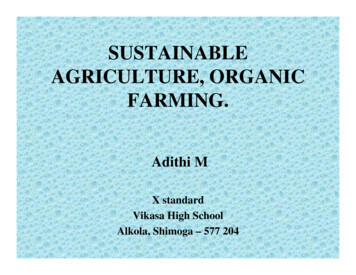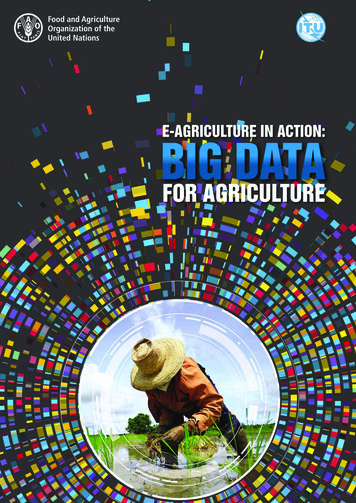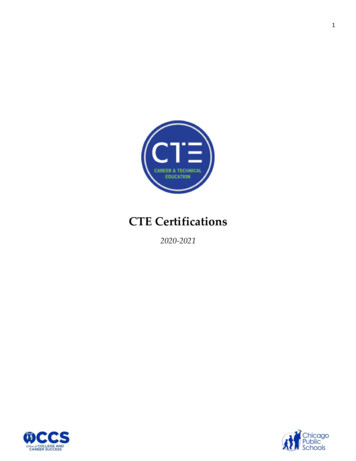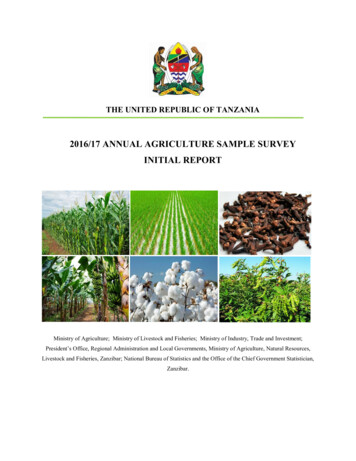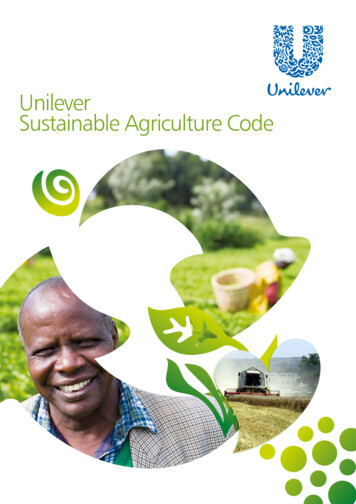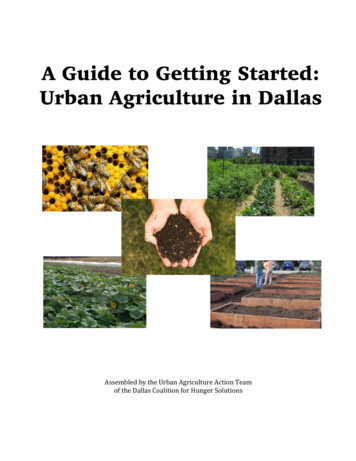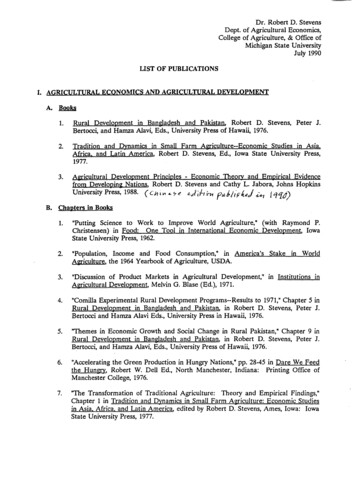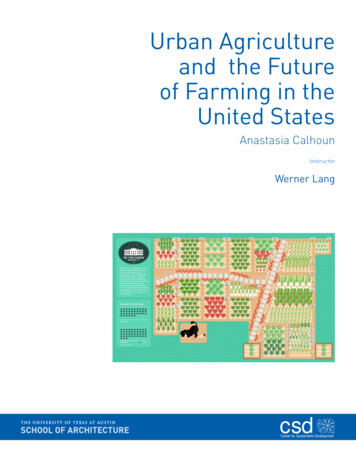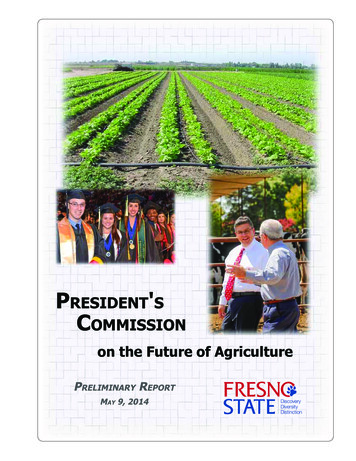
Transcription
President'sCommissionon the Future of AgriculturePreliminary ReportMay 9, 2014
President’s Commissionon the Future of AgriculturePreliminary ReportThis report is a culmination of the initial findings and recommendationsby the President’s Commission on the Future of Agriculture.“Fresno County is the epicenter for agriculture world-wide. This commission willhelp fulfill my vision for Fresno State to become the front-runner in providingCalifornia agriculture with its future employees, industry leaders and innovatorsin production agriculture and food processing.”President Joseph I. CastroMay 9, 2014
Table of ContentsIntroduction . 1Recommendations . 31) Industry Partnerships . 32) Educational Programs. 43) Create a Food and Agriculture Institute . 64) Resources: Infrastructure improvements, new facilities,faculty and staff . 75) Students and Alumni . 86) Applied Research. 97) Communication and Outreach . 108) Water . 11Next Steps. 12The President’s Commission on the Future of Agriculture Members . 13Acknowledgements . 14Related Links . 15Appendix . 161) Jordan College of Agricultural Sciences and Technology (7 pages)2) An Overview of the Jordan College of Agricultural Sciencesand Technology (4 pages)3) University Agricultural Laboratory (2 pages)4) Food and Agriculture Institute: A working concept paper (2 pages)
1IntroductionThe San Joaquin Valley, home of California State University, Fresno, is the richestagricultural production area in the United States. The Valley produces more than 350 ofCalifornia’s 400 commercially grown agricultural commodities, many of which areunique to California. The value of this production exceeds that of any other state in thecountry.Even more impressive is California agriculture’s annual production valued at over 47billion at the farm. This production is essential to the local, regional and state economywhere every 1.00 produced at the farm generates another 3.50 in economic activity.Much of this production is labor dependent with agriculture employing more than450,000 people on the farm and tens of thousands more in related businesses. FresnoState is essential to provide graduates for this diverse, highly skilled and educated laborforce on the farm and beyond.Fresno State’s Jordan College of Agricultural Sciences and Technology (JCAST) has along history of addressing the critical issues affecting California agriculture, providingquality education and conducting applied research. Student-produced, award-winningFresno State wines are medal recipients in state, national and internationalcompetitions. Fresno State’s dairy is the No. 1 university dairy in Jersey milk productionin the nation. Also, JCAST’s hands-on approach to education is made possible by morethan 1,000 acres of on-campus farm laboratory where students produce sweet corn,olives for olive oil, fresh fruits and vegetables, and value added products sold directly toconsumers at the Rue and Gwen Gibson Farm Market located on campus.“We can’t forget what we have and what we can do here.We have the biggest advantage in the world – location inthe heart of the San Joaquin Valley.”Commission Member Lynn Williams,JCAST Faculty Member
2Since its beginning in 1919, Fresno State’s agriculture program has been a tremendousresource for production agriculture and food industries. It has generated appliedresearch and improved cultural practices in such noteworthy areas as the Departmentof Viticulture and Enology founded by the legendary Vincent E. Petrucci. It also hasdeveloped centers and institutes for research, grant and entrepreneurialopportunities, including the Center for Irrigation Technology which is recognized worldwide for excellence in hydraulic testing and evaluation.While agriculture has transformed itself over the decades – born of a necessity toaddress endless challenges such as the current devastating drought – so musteducational institutions that directly impact the future viability of the agricultural and foodindustries.To ensure that JCAST remains on the cutting edge for future generations of studentsand industry, President Joseph I. Castro created the President’s Commission on theFuture of Agriculture. In December 2013, the 19 Commission members began theprocess to identify industry needs and recommend how Fresno State's agriculturalprograms — defined to include intersections with science, mathematics, engineering,business and other disciplines at the University — can be among the very best.“We have a university president who understands thestrength and value of agriculture and who wants to improvethis college. We will work to get this done.”JCAST faculty memberCommission members have toured JCAST’s farm laboratory, met with faculty and staff,and discussed opportunities and challenges. Further, the Commission has (1) reviewedacademic, applied research and public service programs; (2) identified opportunities toenhance agricultural programs and facilities; and (3) recommended strategies tostrengthen partnerships between Fresno State, the agricultural industry, governmentagencies, private foundations and individual philanthropists.The Commission, faculty and staff agree that JCAST’s scope of education and services,and range of influence should far exceed the boundaries of the Valley and that
3recruiting and developing highly motivated students for careers in agriculture and foodindustries is fundamental to its purpose.To do this requires expansion of the current mission, which is, “To provide world-classprograms through innovation and leadership in agriculture, food, family and relatedsciences and technology,” by refining curriculum, expanding facility and staff and fullyembracing public-private partnerships.This report is a culmination of the Commission’s initial findings and recommendations.Recommendations“There has to be ongoing and meaningful programs tonurture and promote industry/university partnerships.”Commission Member Dennis ParnagianInitially, the Commission has identified eight critical areas for attention. Many keycomponents (some of which are in-progress or in the planning stage) are referenced inone or more recommendations, such as an expanded internship program and industrypartnerships, improved communications and outreach, and the need for financial and inkind support, grants and development. The recommendations are as follows.1) Industry Partnerships: Strengthen and expand partnerships with the agricultureand food industries.a. Build from the success of the Viticulture and Enology Research Center(VERC) as a model for improving faculty engagement with industrythrough existing and new centers and classroom/teaching. (SeeRecommendation 6.)b. Strengthen centers of excellence such as the Center for AgriculturalBusiness to benefit from international opportunities while working withstakeholders to expand curriculum.c. Ensure that each department in JCAST has an active, engagedadvisory committee with strong ties to industry. Examples of excellentboard member composition include the Agricultural Business, Industrial
4Technology and VERC advisory committees. (See Appendix.)Advisory committees should include the diversity of California cropsand family farms, livestock production, farming methods, ethnicity andcultures, export markets and food trends. They also should fosterstronger partnership between agricultural producers, grocery/foodmarketing and consumers.d. Emphasize internships with industry. (See Recommendation 2.)e. Develop student on-farm and packinghouse/processing tours withproducers, packers and processors to provide commercial farming,ranching and processing awareness and experience.f. Survey agricultural employers and related industries to determineemployment opportunities. This will assist in evaluating the adequacyof curriculum.g. Strengthen coordination/oversight and communication of ongoingindustry programs on campus.h. Upgrade equipment and technology to state-of-the-art or currentindustry standards. (See Recommendation 4.)i. Increase efforts to engage alumni and friends to develop and supportpartnerships between JCAST and the agriculture and food industries.(See Recommendation 5.)“I am a big supporter of internship programs andcertifications. Students need experiences on theirresumes that will make them more attractive toemployers.” Commission Member Kim Ruiz Beck2) Educational Programs: JCAST’s undergraduate, graduate and continuingeducation programs emphasize problem solving, basic sciences, up-to-datetechnology and business management techniques, implemented by a facultycommitted to teaching students and learning.
5a. Thoroughly review all educational programs with focus on aligningcurriculum with current and future industry needs and employmenttrends. Seek national accreditation as appropriate.b. Create new leadership structure that includes the dean and twoassociate deans for academic programs and operations, and forresearch and collaboration.c. Ensure that curriculum includes leadership training with focus oncritical thinking, development of emotional intelligence, effective writtenand verbal communication and understanding of public policy as itpertains to agriculture and food industries.d. Encourage students to develop an understanding of the state’s waterdelivery systems, policy and critical issues.e. Develop interdisciplinary curriculum involving agriculture, technology,business, science and mathematics, engineering and other disciplinesprovided by the University.f. Involve JCAST, the College of Science and Mathematics, LylesCollege of Engineering and Craig School of Business to utilizeopportunities for research and industry partnerships that will be offeredin the Jordan Research Center.g. Establish interdisciplinary teams to align the University cross-collegeprograms and resources to support excellence in agricultural educationand applied research.h. Support internship programs that provide students with hands-onexperience and enhance interface between Fresno State, theagricultural and food industries, and public.i. Review internships, job shadowing, career pipeline programs andcertifications as potential requirements for graduation.j.Create and expand workforce specific training and certificate programsoffered by industry through Fresno State. JCAST currently offerscertificate/credential programs in agricultural education; childdevelopment (pre-credential); fashion merchandising; dietetics
6advanced study; industry and technology; computer process controlnetwork administrator; networking, routing and internetworkingtechnology; enology special study; and sustainable viticulture specialstudy. These programs should be reviewed and assessed for studentand industry demands for the programs, currency of the curriculum,adequacy of resources and program outcomes.3) Create a Food and Agriculture Institute to serve JCAST and the agriculture andfood industries in programming, research, educational outreach andcoordination.“By creating a Food and Agriculture Institute, manyissues and topics can be addressed, as well as creatinga flexible organization that can respond to the needs ofthe family farmer and agricultural community. I envisiona new type of organization, a perfect interface betweenthe university and the public.” Commission MemberDavid Mas Masumotoa. Nurture and promote farm/food/university partnerships, which serve todevelop internships, sponsorships, conferences, communications andfuture initiatives for JCAST.b. Serve as a clearinghouse for internships and apprentice programs.c. Establish communications between JCAST and the agricultural andfood community to align academic programs, applied research anddevelopment.d. Coordinate use of Fresno State generated intellectual property by thefarming, animal science and food processing communities.e. With the involvement of JCAST faculty and staff, coordinate farm andfood field days and conferences.f. Disseminate information about issues such as food safety, labor, trade,water, sustainable agriculture and the environment.
7g. Interact with school districts and community colleges to articulateJCAST programs and encourage interest in agriculture and foodrelated careers.h. Develop and communicate JCAST’s excellence in subject areas suchas enology and water technology. (See Recommendation 7.)i. Engage alumni and friends to support JCAST goals and objectives.(See Recommendation 5.)j.Sponsor food events. The outreach should include the urbancommunity. Existing food science, Culinology and nutrition programsshould broaden their scope where possible. Food is the commonthread that bridges family farms and ranches, agribusinesses and foodproduction with consumers and conveys relevancy.k. Explore developing a facility to celebrate food, incorporating galleriesshowcasing the science of food, the history of Valley agriculture andthe significant role the Valley plays in meeting societal needs. Similarto a concept developed by students from the Lyles College ofEngineering, this facility could include interactive spaces, workshopareas and a food theater/demonstration area.4) Resources: Infrastructure improvements, new facilities, faculty and staff. Aspart of the successful Campaign for Fresno State fundraising effort in 2013,JCAST raised more than 51 million for students, faculty, staff and facilities.Recent new facilities include: The popular Rue and Gwen Gibson Farm Market that showcasesstudent products. The upcoming Jordan Research Center, which will become the first-ofits-kind research center on a California State University campus.“Our strengths are right in this room. You are herebecause you care and will help carry out the long-termvision for JCAST.” Commission Member Pat Ricchuiti tofaculty and staff at a joint meeting.
8The Commission, with input from faculty and staff, identified improvementsfor JCAST to reach its potential.a. Find ways and means to increase the number of faculty and staff.Insufficient faculty and staff limit the opportunity to serve students andto conduct research driven by industry partnerships.b. Recruit well-qualified faculty that understand the value of industryinteraction. Every faculty member should be a recruiter for JCAST.c. Develop resources to address aging facilities and equipment, and toexpand infrastructure.d. Create a state-of-the-art dairy processing facility and a modernizedmeat processing center.e. Improve demonstration units using the Gibson Farm Markettransformation as a model.f. Improve classroom quality, interactive technology, size, studentcomfort and safety. Improve laboratory facilities. Renovate JCASTfacilities located in the Grosse Industrial Technology Building.g. Preserve and improve the existing University Agricultural Laboratoryexclusively for agricultural purposes.h. Embrace planned improvements to Barstow Avenue, with input fromJCAST on areas that touch JCAST sites.i. Support JCAST strategic development initiatives to increaseendowments, student support, facilities and programs.5) Students and alumni: A successful college educational program is notpossible without engaged faculty, students and alumni. JCAST should becommended for producing graduates and future employees/industry leaderswho “hit the ground running.” The rapidly evolving sophistication of Californiaagriculture now requires that JCAST expand its efforts.
9a. Promote “legacy” recruitment of students whose parents and relativesattended Fresno State.b. Recruit high-achieving, well-rounded high school students withdeveloped leadership skills. Use Fresno State events such as thestatewide FFA Conference to increase awareness of JCAST.c. Recruit through student-run enterprises, Ag One Foundationscholarships and opportunities for applied research programs forundergraduate and graduate students.d. Develop a summer institute for talented high school students interestedin agriculture and food related careers, providing a meaningful precollege experience at Fresno State before they apply to college.e. Expand participation in and create new opportunities for job fairs,focusing on agricultural and food related career opportunities.f. Support students through scholarships, competitions, extra-curricularactivities, professional organizations and continuing education.g. Expand outreach to recent JCAST graduates and survey studentgraduation rates and job placement.h. Develop new and improved methods to engage alumni and friends inprograms, internships, career pipelines and public-private partnerships.(See Recommendation 7.)6) Applied Research: The California Agricultural Technology Institute, created in1984, serves as the umbrella for JCAST research and grant opportunities. Theaddition of the Jordan Research Center, slated for groundbreaking in spring2014, will provide a state-of-the-art facility to conduct long-term scientific andengineering innovation in such areas as food and wine sensory evaluation,water modeling, bioenergy systems, environmental quality, microbiology,entomology and plant pathology. More can be done to support and improveongoing and planned programs.a. Prioritize opportunities such as irrigation and water technology, foodsafety and energy efficiency.
10b. Advance development of patents where applicable.c. Create an environment where research and technology transfer toindustry will thrive.d. Address faculty release time to provide for increased research andindustry engagement.e. Improve industry outreach to explore new problem-solvingopportunities for partnerships, using the Viticulture and EnologyResearch Center and the Center for Irrigation Technology as models.f. Review integration of research centers/institutes with core academicprograms, and develop additional opportunities for departments inJCAST and with other colleges.g. Aggressively pursue grants, donations and alumni support for appliedresearch programs and infrastructure to accommodate grant programs.h. Enhance working partnerships with all government agencies, includingthe California Department of Food and Agriculture and the USDA.i. Foster interdisciplinary collaborations with the Lyles College ofEngineering, the College of Science and Mathematics and othersfocused on addressing issues and concerns relevant to the CentralValley.7) Communication and Outreach: There are many stories in JCAST waiting to betold, including those about exceptional students who have overcome obstaclesto pursue their educational dreams.a. Create and recruit a public relations/communications staff positionwithin JCAST to develop and implement an ongoing internal andexternal plan to increase awareness of JCAST.b. Lay the foundation to attract high-achieving students and highlyqualified faculty, engage alumni and attract investment for agricultureand food related initiatives.c. Develop messaging to help instill pride in JCAST students who willbecome alumni and future supporters.
118) Water: Ample surface and groundwater supplies are essential for agriculturalproductivity. With increasing competition for limited developed water,agriculture must manage water efficiently and safely for the ultimate benefit ofall Californians.“Fresno County is ‘Ground Zero’ on water andagricultural issues. Fresno State has the goldenopportunity to take advantage of that and create majorsand programs that address those issues.” CommissionMember Mario SantoyoPresident Castro will create a campus/industry task force to coordinate existingwater-related programs and to redefine Fresno State as a recognized leader inthe area of water technology, water resource management and policy.The Commission supports this action, which will add value to existingprograms.a. Promote findings of the task force as full-service to industry, academiaand government.b. Create water-related majors/minors that train future water managersand related positions. Such courses would include water systems,irrigation technology, agricultural engineering, agricultural andenvironmental biology, water policy and water resource management.c. Promote the Water and Energy Technology (WET) Incubator as aninternship and career development center for students and facultyinterested in water and energy related issues. Establish partnershipswith other Colleges to enhance the visibility and utility of the WETIncubator.d. Improve alignment between water cohort faculty to better connect themto water centers and institutes, research, agricultural programs,science and engineering.
12Next StepsChallenged by President Castro to think boldly and broadly, Commission members didjust that, offering specific ideas and creative paths to strengthen JCAST and position itto be a world-class agricultural education institution.This report is preliminary, but represents the beginning of an expansive processrequiring the full engagement of industry leaders throughout California who are willing toshare their time, talent and resources with the University and JCAST.The Commission will continue its work on behalf of President Castro by assisting in theimplementation of its recommendations and others that may follow. Throughout thisongoing process the Commission looks forward to working shoulder-to-shoulder withfaculty, staff, students, industry partners, alumni and friends of JCAST.“We need to make Fresno State the best – not just a niche,not a regional leader, but the best agricultural college.”Commission Member Barry Bedwell
13The President’s Commission on the Future of AgricultureCo-chairsGeorge Soares, Managing Partner, Kahn, Soares & Conway, LLP,Hanford/Sacramento; Owner, Log Haven Dairy, HanfordDr. Andrew Hoff, California State University, Fresno, Interim ProvostCommission membersDarius Assemi, President, Granville Management Inc., FresnoKim Ruiz Beck, Chairman, Ruiz Food Products Inc., DinubaBarry Bedwell, President, California Grape and Tree Fruit League, FresnoCarol Chandler, Co-owner, Chandler Farms, SelmaOctavia Diener, Member, Fresno State Foundation Board of Directors, FresnoDr. Susan Elrod, Fresno State, Dean, College of Science and MathematicsRyan Jacobsen, Executive Director & CEO, Fresno County Farm Bureau;President, Ag One Board of Directors, FresnoDavid Mas Masumoto, Owner, Masumoto Family Farms, Del ReyMarvin Meyers, Owner, Meyers Farming, FirebaughDr. Dennis Nef, Fresno State, Dean, Undergraduate Studies and Associate VicePresident for Academic Programs and ResourcesDr. Ram Nunna, Fresno State, Dean, Lyles College of EngineeringDennis Parnagian, President, Fowler Packing Co.; Ag Foundation Board Member,FowlerPat Ricchuiti, P-R Farms, Inc.; Chair, Ag Foundation Board of Directors; Ag OneBoard Member, ClovisMario Santoyo, Assistant General Manager, Friant Water Authority; ExecutiveDirector, Latino Water Coalition, LindsayBill Smittcamp, President & CEO, Wawona Frozen Foods, ClovisPeter Weber, Member, Regional Job Initiatives, FresnoDr. Lynn Williams, Fresno State, Professor and 2012-14 Chair, Academic Senate
14AcknowledgementsReport Writer:Liz Hudson, APR; Retired Agricultural Communications; Co-owner, HudsonFarms, SangerStudent Staff Support:Monique Bienvenue, Alpha Zeta Cal-Epsilon Past Chancellor and JCAST MediaCoordinator, Fresno StateStaff Support:Shirley Melikian Armbruster, Associate Vice President, UniversityCommunications, Fresno StateSteve Olson, Publications Editor, California Agricultural Technology Institute,Fresno StateAmanda Banks, Events Coordinator, Office of the President, Fresno State
15Related LinksCalifornia State University, Fresno – www.fresnostate.eduJordan College of Agricultural Sciences and Technology – www.fresnostate.edu/jcast/Rue and Gwen Gibson Farm Market – www.fresnostate.edu/agf/farmmarket/Center for Irrigation Technology –www.fresnostate.edu/jcast/cit/Department of Agricultural Business – t of Animal Sciences and Agricultural Education ment of Child, Family and Consumer Sciences ment of Food Science and Nutrition – www.fresnostate.edu/jcast/fsn/index.htmlDepartment of Industrial Technology – ment of Plant Science – tment of Viticulture and Enology – www.fresnostate.edu/jcast/ve/Center for Agricultural Business –www.fresnostate.edu/jcast/cab/College of Science and Mathematics – www.fresnostate.edu/csm/Lyles College of Engineering – www.fresnostate.edu/engineering/Craig School of Business – www.fresnostate.edu/craig/Jordan Research Center – www.fresnostate.edu/jcast/jrc/California Agricultural Technology Institute – www.fresnostate.edu/jcast/cati/Ag One – www.fresnostate.edu/jcast/agonefoundation/
16Appendix
Jordan College of Agricultural Sciences and TechnologyMission:Provide world-class programs through innovation and leadership in agriculture, food, family, andrelated sciences and technologyGoals:1. Serve students through innovative, real-world academic programs2. Conduct applied and strategic research and scholarly activities to benefit the region3. Strengthen the region’s economy, environment, and quality of life.Values: Teamwork Integrity Quality of work Respect AccountabililtyHow does the College see itself?The Jordan College of Agricultural Sciences and Technology is distinctly positioned to serve theeducation, practical research, and continuing education needs for the San Joaquin Valley. Ourprograms are focused on engaging and serving this unique area, the most productive agriculturalregion of the country.By the numbers 7 academic departments-Agricultural Business; Animal Sciences and AgriculturalEducation; Child, Family and Consumer Sciences; Food Sciences and Nutrition;Industrial Technology; Plant Science; Viticulture and Enology. 10 Bachelors degree programs-2097 undergraduate student majors in Fall 2013 6 master degree programs-55 enrolled graduate students in Fall 2013 12 minors and certificate programs 44 tenured/tenure track faculty 24 student clubs and organizations. 200 student employees 6 centers and institutes-California Agricultural Technology Institute; California WaterInstitute; Center for Agricultural Business; Center for Food Science and NutritionResearch; Center for Irrigation Technology; Viticulture and Enology Research Center. 1011 acre farm augmented with 4500 acre San Joaquin Experimental Range and 1000acres of pasture near Millerton Lake 1.5 million in sales through on campus farm market 300 plus medals for student produced wines #1 University owned Jersey milk production herd in the U.S 51 million raised in recent comprehensive campaign-24% of the University total 7- 11 million annually in grant and contract activity-always among the top colleges atthe university in this category
ApplicantsandNew 43Admits8632002 2003 2004 2005 2006 2007 2008 2009 2010 2011 2012 2013 G anIndian 0%20%UnknownPacificIslander enFemale yMath15%None33%OnlyEngl10%59SAT(Math Verb)46418101MajorAll33%ContGen10528 technical. re.com/mapdata2,4751
mFall2013StudentLevel&EnrollmentStatusFreshman SophomoreContinuing2,097 s1Transitory1GrandTotal435Senior ReturningReturningTransferJunior1,4832931Fall Fall Fall Fall Fall Fall Fall Fall Fall Fall Fall Fall2002 2003 2004 2005 2006 2007 200
Fresno State wines are medal recipients in state, national and international competitions. Fresno State's dairy is the No. 1 university dairy in Jersey milk production in the nation. Also, JCAST's hands-on approach to education is made possible by more than 1,000 acres of on-campus farm laboratory where students produce sweet corn,



